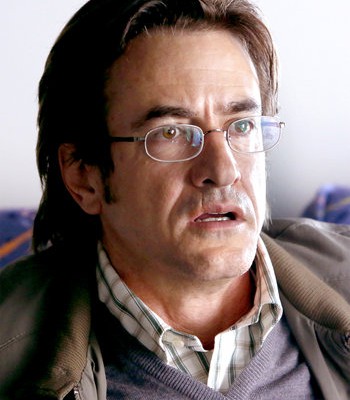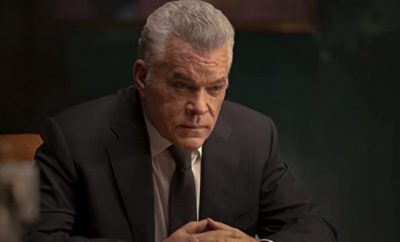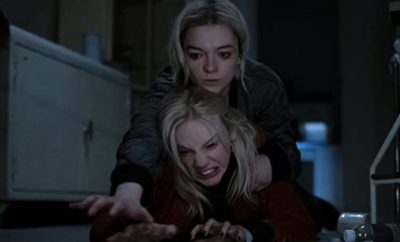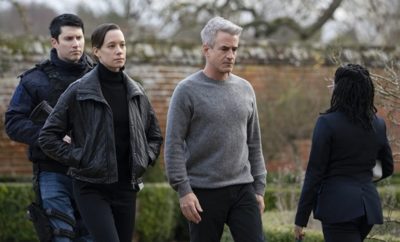
Crisis
Dermot Mulroney – Crisis
Q) We think of you as a leading man, in fact at my house definitely a romantic leading man but that’s not what this role is and when we first see you it looks as if you are among the taken. But then it turns out that you may not be who you first appear to be, can you talk about the hidden elements of your character?
A) There are more hidden elements of the character of Gibson then the current view has any idea about. There’s an incredible plot twist, several of them in fact in this opening episode. But what you need to know is that this keeps happening week after week, it’s what makes this show so fun as it evolved in its story I just kept being so pleased by the twists and turn of the plot. So what I say is there’s more to come if you like that.
Q) As a real life father how do you relate to these characters because this is like their worse nightmare come true when their kids are kidnapped. And do you think the lengths these people go through is realistic at all?
A) I love the world that Far and Rand created for Crisis, it has just about one DNA strand off of reality, so come with us and you won’t hardly notice. That’s what I say about whether it’s believable is it is in the world that we’ve created. Now I can’t personally imagine where I would draw the line if I were coerced or forced to do something to protect my child, so I can’t imagine what I wouldn’t do I think is what one of the parts of the character that I can most relate to on a personal level.
Q) Since your character is a part of the scheme and the kidnapping, but he also has his own daughter involved. Can you talk about how we’re going to see that affect him at all? Are we going to see him torn and what he has to do with him?
A) Yes the story gets really crazy but what stays the same is how much he loves his daughter and how important it is for him to repair his relationship with her and put his family back together. Now his intentions are good, you will see that his methods are questionable at times but then you’ll learn how effective it is. And so the story makes you really question motives versus results. It’s very smart in that way. Another thing I love about it is there is a lot of story coming at you really fast but I’m more surprised to how clear it is. In other words its complex but – the show is complex but it’s not confusing. You’ll see what I mean, it’s really great the way they were able to do that.
Q) Since that first appearance that you made on Fame a lot has happened to you obviously and television has changed a lot. And it seems from what I’m hearing from everybody is television is now the place to be, it’s the hot place for creativity and for actors to really sink their teeth into roles and projects. I’m wondering if you agree with that and how you feel about being on television when suddenly it’s the hot place for creativity?
A) I’m so happy to be doing a show like Crises and especially for NBC at this time because it is different than it was even a few years ago in terms of the stories that a major network is willing to tell. And for me to be honest with you for a long time I thought it would be kind of a grind to play the same character over and over again, so that was one of the things that kept me doing films only. But I was wrong, all I had to do was find a character like this because I was thrilled to work as this character for such a long time. I didn’t expect to be gratified in the way that I was to create a character and develop it over a longer period of time. Yes so it’s a lot different from film and it’s really fun. It’s good company, the show, and just since I mentioned it and NBC’s been great, so there’s that. But also the makers of the show really were smart and responsible and did a great job, so it wasn’t a chaotic thing like I’d also heard a lot of television shows. Or it wasn’t 18 hour days, it was really well managed, so that we cool too.
Q) You talked about, obviously, there’s a lot of twists and turns in the story and everything. Did you get to know a lot of that ahead of time or are you kind of learning it as the story unfolds and how does that affect you playing the part?
A) Yes it is true that I had very little knowledge of what was coming moments later. We’d get the scripts about four or five days in advance, the thing is we did the whole season as planned – 13 episodes, so now I know everything and it’s awesome. There’s some really good semi side-by twists in our story too that I think you people are going to love this. it is – comes unexpected and it’s, you know, it’s not alien mother ships or anything but, you know, there’s some touches. It really does – it’s really enjoyable in terms of those types of stories.
Q) I’m wondering is there a clear-cut answer on whether your character is good or bad? And if there is an answer do you have it and do you have a preference as to whether he’s good or bad?
A) No I have no preference, I prefer that people wonder. But yes I do know for myself and quite clearly is that he is good. There’s not other choice as the person hired to portray this person than that but there will defiantly be – people will wonder that for themselves. Again maybe I said something to that effect before but his intentions are good.
Q) You talked about the fact obviously that you didn’t necessarily have all the answers coming in, that you go sort of from script to script. And the fact that you have obviously done lot of movies over the years and in that case you would have a lot of the answers and the plot points ahead of time. Did you like not having the information? Was this something that was more of a challenge for you? Was it exciting for you sort of coming in and not having all those answers?
A) Yes it took me about two or three episodes before I really embraced it and then I loved not knowing. And I enjoyed, you know, that reading of next week’s script became so enjoyable that I just – and me wanting to know what was happening next wasn’t going to make the scripts be written any faster. I should be clear, there were very specific story points that I was aware of and needed to be in order to play the character who knows the whole plan. But I didn’t know how the other characters were going to develop or how their storylines end up crossing, things like that. The intrigue of the story was the reveal for me each week and so to answer your question I loved it. But not at first, I had to adjust to that way of working. As you said a screenplay ends on a page number and then you close it and you know everything that happens, so it was very different for me.
Q) I was wondering was there anything about this character that you added to him that wasn’t originally scripted for you?
A) That’s interesting – very little, I didn’t improvise dialog at all but the directors that we worked with were really collaborative and well chosen. They were really, you know, sort of 12 or 13 different people came in to work on these scripts to shoot the thing, so that’s where my contribution would be just in how the scene plays. But no I didn’t change anything in the script, I said every word as it was written. I don’t even think there’s a – there’s probably not an extra word in that character at all.
Q) What are some of your most memorable moments you’ve had from filing the show?
A) Well you’ll come to see that a relationship and a dynamic develops within kitchen, so I worked very close with Max Martini he plays Koz he’s in the first episode. He’s got a mask on for some of it but he’s the one that amputates my left pinky. And our other partner in crime was Jessica Dean Turner who was a Chicago actress who was also particularly great in the part. And so we felt like we had our little team there while the Crises crew was off shooting all these other storylines. So it was sort of like they were the – you could color code the storylines, but then of course they all come to cross at the end of the season in a very gratifying way, so stay tuned.
Q) You were saying that you stick to the script, but how much input are you actually allowed? I mean can you develop a backstory for this guy or is it all what they tell you?
A) No it’s all what they tell you, this was that. I would have approached this anyway but I think that television’s sort of more typically works like that. I mean you’ve always heard it’s a writer’s medium and so forth, so I came in knowing that I would just be doing the job that I was asked to do. But that’s how it’s done really, I’m not sure this web of plot was so intricate that there wasn’t anything I could do to – there wasn’t anything I could add. I mean that wasn’t my job either, so this for me was fun because I was reading the scripts like a spy novel and then just doing what they said. But I didn’t know – in Episode 4 necessarily how something I was doing was going to affect something we would shoot for Episode 8. That’s a bad – that’s a confusing example, what I mean is as we were going – yes I just followed the steps as they laid them out in front of me, yes.
Q) Well knowing that now and I’m looking back over the episodes you filmed, is there anything you would have done differently?
A) No. No the writers were giving away the right amount at the right time throughout this story. I think that – now I understand your question, and I think your answer will be best understood like you said around Episode 8 or 10.
Q) I’d like to ask you what you admire most about Gibson?
A) Oh yes, well there are two things – his, you know, his heart and his mind. I very much admire the reasons that he goes to the lengths that he does and makes the decisions he does, which is an intense and profound love for his daughter and his family. But the thing that most impresses me about Gibson is how truly genus he is. Its fun to play a character that is vastly more intelligent than the – than I am to be frank. It made me feel really smart.
Q) What do you think is the most challenging aspect of playing him?
A) I found it difficult sometimes to contain my evil glee as other stuff takes place later on. I’ll be hones with you it’s really fun to play that character, my challenge was to play it in a contained and controlled way. I mean yes there are other aspects to the character that are challenging too, but that was one of them for sure, just to be real cool I guess.
Q) Once your pinky had been severed, you’re in the room with a couple of other people you kept looking at that notebook and it seems really important. What can you tell us about that?
A) The notebook is as much a character in this – in this series as well, so it becomes – it’s its own storyline in a way and it’s one of the best props I’ve ever worked with. And I wish I had in my mind the name of the woman who worked on this prop – page after page of intricate diagram – drawings, all of which dealt directly with the story And they were – if you can imagine this there were things in that book when we were shooting the pilot that I didn’t know about until about seven months later when we were shooting the series and that’s when the picture that had been in the notebook the whole time came into play – really fascinating for me, thanks for asking about that. And for me the double whammy plot where you cut the finger off and then right away it’s revealed that he had planned even that I think is what makes this first episode so great. In other words a lot of other writers would have had the one and then a little while later would have had the other. Rand and Far gave you that bing-bang back-to-back plot twist I think that’s just irresistible. It’s great the way they structured the reveals in this first episode and we do that throughout the series.
Q) If you can take a page out of the script and implement it in your life what page would it be?
A) Francis Gibson’s really good on the phone – you know people like that? You’ll see what I mean later – if I had that same facility on to do business on the telephone who knows what I could have accomplished. He’s just one of those people that’s got that skill I’ll say that – it would be a nice skill to have.
Q) If you could change anything in your script what would it be?
A) Oh I wouldn’t change it, but I will say that by the sixth month of sort of tying my pinky down to my hand I was wishing that that self-amputation hadn’t happened. I’ll be honest with you it made me a little cranky there at the end. But I wouldn’t change it, it was well worth it. It just isn’t as much – it’s slightly uncomfortable as you’d imagine but it also because very inconvenient everyday to have the make-up man strap your finger down – yes, yes. But to be honest I wouldn’t change it for sure. And you’ll see that the amputated pinky comes into play – I mean you saw the kid put it in the cup of ice, right. So stay tuned for that too.
Q) We’ve seen Gibson in the first episode as being pretty surprisingly strong and in control kind of guys, are we going to see weaknesses at some point soon?
A) Well his weakness of course is – no I’ll answer it this way, not everything in Gibson’s master plan is going to go as he conceived. So some of the fun parts of the series are to see Gibson think on his feet and have to adapt to the changing situation. So there’s that tension between knowing that he has a great plan and learning that it’s not going according to that plan and what’s the character going to do next becomes part of the series. It is a good question for that reason because yes he – he’s always close to having everything under control but it’s not as simple as that. As I said it’s a very complex story so he has to adapt as it evolves.
Q) So what kind of reaction is he likely to have if things don’t go according to plan then?
A) I try to answer everything but I’m not about to tell you that – I’m not about to tell you that.
Q) You have had such a long career, but when you look back now how do you see Young Guns and would you say you are good friends with any of the other actors that played in the film?
A) Even when I was shooting Young Guns I think I was 23 or 24 – even when I was shooting it I knew it was going to be one of the best experiences of my life. And all these years later somewhat – I can’t even think, is it past 20 years later – 25 years later, I was right it’s still one of the most amazing things I went through. And the movie’s still – really stood the test of time, it stands on its own still. It doesn’t feel dated or anything. It’s a great movie – thanks for asking about that, I’m really proud of it. Oh and I have one more thing to say about – oh whether I see any of the guys – yes we stayed friends for some years and the way things go, yes we’re all still friendly. I saw Charlie not too long ago and it was like seeing someone you went to college with. Really fantastic – those are all really good guys who I still admire for what they’ve done since.
Q) And have you shown the film to your son? Does he ask you how to hold a gun?
A) Yes – no, no guns around here, that’s all just acting. But I did show my son and we enjoyed watching that movie together almost more than any other. That was a couple years ago so we should probably watch it again – thanks for reminding me.
*CONFERENCE CALL*





You must be logged in to post a comment Login